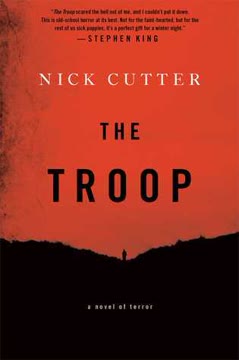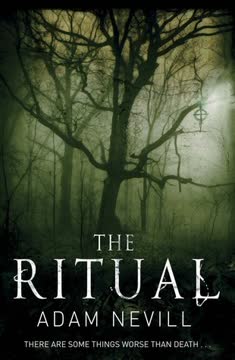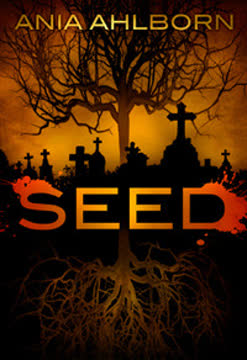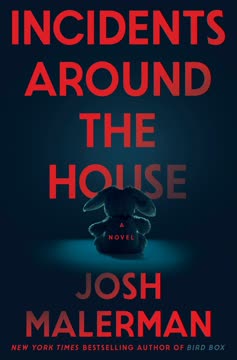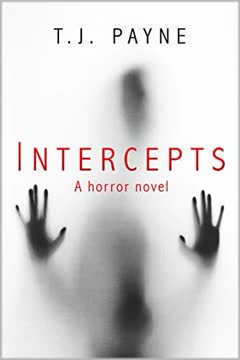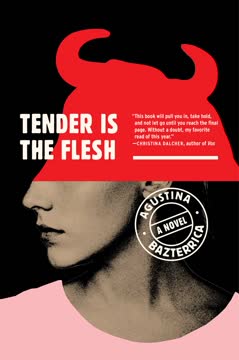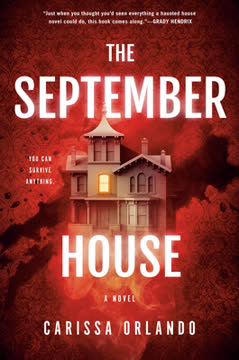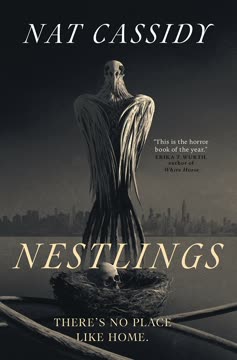Plot Summary
Into the Woods, Into Danger
embark on a camping trip to a remote Canadian island, led by Scoutmaster Tim Riggs. The troop, consisting of Kent, Ephraim, Max, Newton, and Shelley, anticipates a weekend of bonding and adventure. However, an unexpected storm looms, hinting at the ominous events to come. The boys are unaware that their journey will soon spiral into a nightmare, testing their survival skills and their trust in one another. The island, initially a place of adventure, becomes a crucible for the boys' endurance and camaraderie.
The Hungry Man's Arrival
stumbles into the boys' campsite, setting off a chain of terrifying events. The man, driven by an insatiable hunger, is a carrier of a bioengineered parasite. His presence introduces a deadly threat to the troop, as the parasite begins to spread. Scoutmaster Tim, trying to help the stranger, inadvertently exposes himself and the boys to the horror lurking within the man's body. The troop's idyllic camping trip turns into a fight for survival against an unseen enemy, as the boys confront the terrifying reality of their situation.
A Terrifying Transformation Begins
as the stranger succumbs to the infestation. Tim, realizing the danger, attempts to contain the situation but is already showing signs of infection. The boys, witnessing the gruesome transformation, are thrust into a world of fear and uncertainty. The once-trusted figure of their scoutmaster becomes a potential threat, and the boys must grapple with the reality that their leader may no longer be able to protect them. The transformation serves as a chilling reminder of the fragility of human control in the face of an unstoppable biological threat.
Isolation and Desperation
, the boys face the harsh reality of their isolation. The storm prevents any hope of rescue, and the troop must rely on their wits and limited resources to survive. As tensions rise, the boys' unity begins to fracture. Trust erodes as they question each other's motives and actions. The island, once a place of adventure, becomes a prison where the boys must confront their deepest fears and the possibility of betrayal. The isolation amplifies their vulnerability, testing their relationships and their ability to maintain their humanity.
The Worms Within
as it spreads among the troop. The boys witness the horrifying effects of the infestation, which consumes its host from the inside out. The worms, relentless in their hunger, drive their hosts to madness and death. The boys must navigate the treacherous landscape of the island while avoiding infection. The line between friend and foe blurs as the parasite's influence grows, threatening to turn the boys against each other. The narrative explores the tension between the instinct for survival and the loss of self.
A Descent into Madness
reaches a fever pitch as the boys confront the reality of their situation. With their scoutmaster incapacitated and the threat of the worms ever-present, the boys must make difficult decisions to ensure their survival. As the island's isolation takes its toll, the boys' sanity begins to fray. The once-clear boundaries of right and wrong dissolve, leaving the boys to grapple with the darkness within themselves and the monstrous threat that surrounds them. The story delves into the psychological unraveling of the characters, exploring themes of fear, madness, and the human capacity for both cruelty and compassion.
A Desperate Plan Unfolds
As the boys grapple with the chaos around them, Newton suggests a plan to focus their minds: find food, medicine for Kent, and a way off the island. Despite the grim situation, Newton's methodical approach offers a glimmer of hope. However, Shelley, detached and unpredictable, sows seeds of doubt, suggesting they might be quarantined due to contagion. The boys' unity is tested as they face the harsh reality of their isolation and the looming threat of the parasite. The plan underscores the importance of strategy and hope in dire circumstances.
The Island's Grim Reality
The boys witness a dramatic scene as a boat is pursued and destroyed by military vessels, reinforcing their fears of being trapped. Newton's attempt to retrieve supplies from the cabin is fraught with danger, as he narrowly avoids the parasitic threat. The boys' situation becomes increasingly dire, with the island's isolation and the military's presence underscoring their helplessness. The realization that they are part of a larger, uncontrollable situation begins to sink in, highlighting the broader implications of their predicament.
Shelley's Dark Descent
As the boys struggle for survival, Shelley embraces the chaos, revealing his true nature. He manipulates Ephraim's fears, pushing him towards self-destruction. Shelley's detachment from reality and his sadistic tendencies come to the forefront, making him a dangerous presence among the group. His actions highlight the psychological toll the situation has taken on the boys, as he becomes a symbol of the darkness within. Shelley's descent into madness serves as a chilling portrayal of the psychological effects of isolation and fear.
Newton's Tragic Sacrifice
Newton, now infected, faces his fate with a mix of resignation and courage. Despite his deteriorating condition, he remains a source of strength for Max, offering wisdom and companionship. His ultimate sacrifice is a poignant moment, underscoring the themes of friendship and loss. Newton's death is a turning point, leaving Max to confront the horrors of the island alone, with the weight of their shared experiences on his shoulders. His character arc is a powerful exploration of sacrifice and the human capacity for courage.
Max's Final Stand
With Newton gone, Max is left to navigate the treacherous landscape of the island. He retrieves the spark plugs from the cavern, a harrowing task that tests his resolve. As he attempts to escape by boat, the military's intervention leads to a tragic conclusion. Max's journey is a testament to his resilience and the enduring human spirit, even in the face of insurmountable odds. His character embodies the themes of endurance and hope, highlighting the importance of perseverance in the face of overwhelming fear.
The Aftermath of Horror
In the aftermath, Max is left to grapple with the trauma of his experiences. The military's actions and the societal response to the outbreak reveal the darker aspects of human nature. Max's survival is both a blessing and a curse, as he becomes a living reminder of the horrors that unfolded on the island. The story concludes with a reflection on the nature of survival and the indelible impact of trauma. The narrative explores the psychological scars left by the ordeal and the enduring impact of the events on those who survive.
Characters
Tim Riggs
Tim Riggs is the well-meaning leader of the troop, whose attempt to help a stranger leads to his own infection. As the parasite takes hold, Tim's ability to protect the boys diminishes, and he becomes a symbol of the danger lurking within. His transformation from trusted leader to potential enemy highlights the fragility of human control in the face of an unstoppable biological threat.
Kent Jenks
Kent is the troop's natural leader, known for his physical strength and assertive personality. However, as the situation deteriorates, Kent's confidence is shaken. His struggle to maintain control and protect his friends is complicated by the parasite's influence, which tests his loyalty and challenges his leadership.
Ephraim Elliot
Ephraim is known for his daring nature and quick temper. As the troop's situation becomes dire, Ephraim's impulsiveness both aids and endangers the group. His internal battle with anger and fear reflects the broader struggle of the boys to maintain their humanity in the face of overwhelming terror.
Max Kirkwood
Max emerges as the story's central figure, embodying the themes of endurance and hope. His journey from a boy on a camping trip to a lone survivor is marked by loss and resilience. Max's ability to adapt and persevere in the face of overwhelming fear highlights his inner strength. His relationship with Newton provides emotional depth, underscoring the importance of friendship in dire circumstances.
Newton Thornton
Newton's analytical mind and calm demeanor make him a stabilizing force among the boys. His ability to devise plans and offer guidance is crucial to their survival. Despite his eventual infection, Newton's bravery and selflessness shine through, leaving a lasting impact on Max. His character arc is a poignant exploration of sacrifice and the human capacity for courage.
Shelley Longpre
Shelley's descent into madness is a chilling portrayal of the psychological effects of isolation and fear. His sadistic tendencies and manipulation of Ephraim reveal a dark, twisted nature. Shelley's actions serve as a catalyst for the group's disintegration, highlighting the fragility of human morality under extreme stress. His character embodies the story's exploration of the darkness within.
Plot Devices
The Parasite
The parasite serves as the central antagonist, driving the narrative's tension and horror. Its ability to consume and control its host creates a pervasive sense of dread. The parasite's influence on the boys highlights themes of dehumanization and the fragility of identity. Its presence forces the characters to confront their mortality and the limits of human resilience.
Isolation
The remote setting amplifies the boys' sense of isolation and vulnerability. Cut off from the outside world, the island becomes a testing ground for their survival instincts and moral boundaries. The isolation serves as a catalyst for the characters' psychological unraveling, exploring themes of fear, madness, and the human capacity for both cruelty and compassion.
Transformation
The transformation of the infected into hosts for the parasite underscores the theme of dehumanization. As the parasite takes hold, the boys witness the erosion of identity and control. This transformation serves as a chilling reminder of the fragility of human life and the ease with which it can be stripped away. The narrative explores the tension between the instinct for survival and the loss of self.
Analysis
"The Troop" by Nick Cutter delves into the darkest corners of human nature, exploring themes of fear, isolation, and the struggle for survival. The narrative examines the fragility of human control in the face of an unstoppable biological threat, highlighting the psychological toll of isolation and the erosion of identity. The story's exploration of the darkness within each character serves as a chilling reminder of the human capacity for both cruelty and compassion. Through its harrowing depiction of survival, "The Troop" offers a poignant reflection on the nature of fear and the enduring human spirit.
Last updated:
FAQ
Synopsis & Basic Details
What is The Troop about?
- A Wilderness Nightmare Unfolds: The Troop by Nick Cutter plunges five Boy Scouts and their scoutmaster, Tim Riggs, into a horrifying fight for survival on a remote Canadian island. What begins as a traditional camping trip quickly devolves into a bio-engineered nightmare when an emaciated stranger stumbles into their camp, carrying a voracious, rapidly mutating parasite.
- Descent into Primal Chaos: Cut off from the mainland by a mysterious military quarantine and a devastating storm, the boys must confront not only the external threat of the infection but also the internal breakdown of trust, sanity, and humanity as the parasite's influence turns them against each other. The narrative explores the brutal realities of isolation and the fragility of civilization.
- Body Horror & Psychological Terror: The story is a visceral exploration of body horror, as the parasite gruesomely transforms its hosts, coupled with deep psychological terror as the boys grapple with extreme hunger, paranoia, and the loss of their innocence. It's a relentless tale of survival where the line between victim and monster blurs.
Why should I read The Troop?
- Unflinching, Visceral Horror: For readers seeking genuinely disturbing and graphic horror, The Troop delivers an unvarnished portrayal of biological terror and human degradation. Nick Cutter doesn't shy away from the grotesque, making for a truly unsettling and memorable reading experience that pushes boundaries.
- Deep Psychological Exploration: Beyond the gore, the novel offers a compelling psychological study of boys under extreme duress, exploring themes of leadership, loyalty, betrayal, and the primal instincts that emerge when societal norms collapse. It's a modern Lord of the Flies with a biological twist, prompting reflection on human nature.
- Masterful Pacing & Structure: Cutter employs a unique narrative structure, interspersing the main story with unsettling "evidence logs" (news clippings, lab reports, testimonies). This technique not only builds suspense and provides crucial background information but also broadens the scope of the horror, hinting at a larger, more terrifying conspiracy.
What is the background of The Troop?
- Bio-engineered Parasite Origin: The core of the horror stems from a genetically modified hydatid worm, a bio-weapon developed by the sociopathic Dr. Clive Edgerton. His lab journals reveal a chilling pursuit of "holy grails" like weight loss and anti-aging, which inadvertently created a hyper-virulent, adaptable parasite capable of consuming its host from the inside out.
- Military Containment & Cover-up: The island setting is not accidental; it becomes a quarantined "petri dish" for military observation and containment. Interspersed testimonies from Admiral Stonewall Brewer and Dr. Nathan Erikson expose a ruthless, top-down decision to sacrifice the island's inhabitants to prevent a global pandemic, highlighting themes of governmental ruthlessness and the expendability of human life in the face of perceived greater good.
- Prince Edward Island Setting: The story is set off the coast of Prince Edward Island, a seemingly idyllic Canadian province known for its quiet charm and rural communities. This pastoral backdrop starkly contrasts with the horrific events, amplifying the sense of violation and making the horror feel more immediate and invasive, as it corrupts a place traditionally associated with innocence and tranquility.
What are the most memorable quotes in The Troop?
- "Adults are obsolete children.": This epigraph, attributed to Dr. Seuss, profoundly foreshadows the novel's central theme of adult failure and the boys' forced maturation. It suggests that adults, despite their supposed wisdom, are often ill-equipped to handle true chaos, leaving the children to navigate a world where traditional authority figures become irrelevant or even dangerous.
- "The wickedness of others becomes our own wickedness because it kindles something evil in our own hearts.": A quote from Carl Jung, recalled by Scoutmaster Tim Riggs, this line perfectly encapsulates the psychological contagion that spreads among the boys. It highlights how external horror can awaken latent darkness within individuals, transforming fear into cruelty and self-preservation into monstrous acts.
- "You hold on to life until it gets ripped away from you. Even if it gets ripped away in pieces. You just hold on.": Spoken by Max Kirkwood in the aftermath, this quote distills the novel's brutal philosophy of survival. It reflects the relentless, agonizing struggle of the infected characters to cling to life even as their bodies are consumed, and Max's own enduring, albeit traumatized, resilience.
What writing style, narrative choices, and literary techniques does Nick Cutter use?
- Unflinching Sensory Detail: Cutter employs highly graphic and visceral descriptions, particularly of body horror and decay, to immerse the reader in the grotesque reality of the parasite's effects. This includes detailed accounts of physical deterioration, internal squirming, and the sickening sweet smell of infection, creating a truly immersive and disturbing atmosphere.
- Epistolary and Fragmented Narrative: The novel masterfully uses an epistolary structure, interweaving the main third-person narrative with "evidence logs" like news articles, lab journals, and military testimonies. This fragmented approach builds suspense, provides crucial exposition from multiple perspectives, and expands the horror beyond the island, hinting at a larger, more sinister conspiracy.
- Psychological Realism and Symbolism: Cutter delves deep into the psychological states of the characters, portraying their descent into madness, paranoia, and primal behavior with chilling realism. The island itself becomes a potent symbol of isolation and a crucible for human nature, while the parasite embodies themes of unchecked scientific ambition and the fragility of the human body and mind.
1. Hidden Details & Subtle Connections
What are some minor details that add significant meaning?
- Tim's Mosquito Encounter Foreshadows: Early in the novel, Tim Riggs is overwhelmed by a swarm of mosquitoes after turning off the generator, feeling "beset by thousands, millions, of tiny assailants." This seemingly minor annoyance subtly foreshadows the true nature of the parasitic threat—a multitude of tiny, unseen entities that will relentlessly attack and consume the boys from within, overwhelming them.
- Newton's "Nerd Scent" and Resilience: Scoutmaster Tim's internal monologue describes Newton as having an "ineffable scent of isolation and lonely forbearance." This detail, while initially a cruel observation, later highlights Newton's unique resilience; his lifelong experience with social isolation and quiet endurance ironically prepares him better for the extreme psychological and physical torment of the island than his more "normal" peers.
- The Missing Spark Plugs' Origin: The initial mystery of the boat's missing spark plugs is a crucial plot point, but the later revelation that the "hungry man" (Tom Padgett) ate them is a chilling detail. Max's discovery of them inside the dead man's stomach ("shining in... his stomach") underscores the parasite's extreme hunger and the host's desperate, irrational actions to prevent capture, adding another layer to the horror of the infection.
What are some subtle foreshadowing and callbacks?
- Gurkha Story's Dark Echoes: Ephraim's campfire story about the Gurkhas, elite soldiers driven "batshit madmen" by blood and violence, subtly foreshadows the boys' own descent into primal savagery and madness. The detail about checking bootlaces for survival is a grim callback when Newton, despite his fear, still checks his, highlighting his ingrained adherence to rules even in chaos.
- Max's Shearwater Story and Parental Guilt: Max's memory of his father's attempts to seal off a bird's nest, inadvertently killing the birds, serves as a poignant callback to the military's "containment" strategy on the island. It foreshadows the tragic consequences of well-intentioned but ultimately destructive adult interventions, mirroring the parents' helplessness and the military's ruthless sacrifice of the boys for a "greater good."
- Tim's Parking Garage Memory: Tim's flashback to a "sick" man in a parking garage, whose face was "rotted black of a banana" and eyes harbored a "remote intellect," subtly foreshadows the horrifying physical and mental deterioration he will witness and experience. It's a premonition of the dehumanizing effects of the parasite, hinting at a conscious awareness within the ruined host.
What are some unexpected character connections?
- Shelley's Shared Sadism with Edgerton: While not directly connected, Shelley's innate sadism and detached curiosity about suffering ("He preferred to alter them. It was more interesting.") mirrors Dr. Edgerton's chilling scientific detachment and willingness to inflict extreme pain for "progress." Both characters find a perverse "pleasure" in manipulation and destruction, suggesting a shared, dark psychological archetype.
- Max and Newton's Evolving Interdependence: Initially, their relationship is defined by Newton's "nerd" status and Max's occasional bullying. However, as the crisis escalates, they become deeply interdependent, with Newton's intellect and Max's practicality forming a crucial survival unit. Their final moments together, marked by shared vulnerability and a desperate attempt to save each other, highlight an unexpected bond forged in extreme adversity.
- The Fathers' Parallel Desperation: The inter-chapter documents reveal that Kent's father, Jeff Jenks (police chief), and Max's father, Reggie Longpre (coroner), attempt a desperate, illegal boat trip to the island. This shared act of paternal desperation, despite their differing personalities and social standing, creates an unexpected bond between them, mirroring the boys' own struggles with loyalty and survival.
Who are the most significant supporting characters?
- Dr. Clive Edgerton (The Architect of Horror): Though never directly interacting with the boys, Edgerton is the unseen antagonist, a "ratshit crazy" genius whose bio-engineering experiments unleashed the parasite. His lab journals and Erikson's testimony reveal his chilling disregard for ethics and human life, making him the ultimate source of the island's nightmare and a symbol of scientific hubris.
- Dr. Nathan Erikson (The Complicit Witness): Edgerton's reluctant assistant, Erikson's testimony provides crucial, horrifying details about the parasite's development and its effects on test subjects. His internal conflict and eventual guilt highlight the moral compromises made in the pursuit of scientific "progress," serving as a cautionary figure who knew the truth but failed to act.
- Admiral Stonewall Brewer (The Ruthless Strategist): The military commander overseeing the quarantine, Brewer embodies the cold, utilitarian logic of containment at any cost. His testimony reveals the brutal decision to sacrifice the boys and sterilize the island, presenting a chilling perspective on the "greater good" and the dehumanizing nature of military protocol in a crisis.
2. Psychological, Emotional, & Relational Analysis
What are some unspoken motivations of the characters?
- Tim's Need for Paternal Connection: Scoutmaster Tim, described as "unmarried and childless," cherishes the annual trip as his "yearly vacation" and a chance to connect with the boys. His initial decision to help the "hungry man" stems not just from his Hippocratic oath but also an unspoken desire to nurture and protect, which tragically leads to his downfall and the boys' exposure.
- Kent's Drive for Dominance and Validation: Kent, the "alpha-male moniker," is deeply motivated by his father's lessons on leadership ("It's all how you present yourself, son.") and a desperate need to prove his strength and control. His increasingly aggressive actions, from taking the walkie-talkie to locking up Tim, are driven by a fear of weakness and a desire to maintain his perceived authority among the boys.
- Newton's Quest for Acceptance and Utility: Newton, often teased for being a "nerd," is implicitly motivated by a desire for acceptance and to prove his worth to his peers. His meticulous planning, knowledge of survival skills, and willingness to confront danger (like entering the cabin or eating the grub) are all subtle attempts to be seen as valuable and indispensable, culminating in his tragic self-sacrifice.
What psychological complexities do the characters exhibit?
- Denial and Rationalization as Coping Mechanisms: Tim initially rationalizes the stranger's condition as a "commonplace malady run amok" and later dismisses his own symptoms as a "fever." This denial, common in the face of overwhelming horror, allows him to maintain a semblance of control, but ultimately prevents him from taking truly decisive action until it's too late.
- The Contagion of Fear and Rage: The novel vividly portrays how fear, when unchecked, transmutes into rage and irrationality. Ephraim's inherited temper, exacerbated by terror, leads to self-mutilation and violence against Kent. Max's own "flash pot of rage" after Shelley stabs him demonstrates how extreme stress can strip away civility, revealing primal, aggressive instincts.
- Dehumanization and Objectification of the Infected: As the boys become infected, their peers increasingly view them as "things" rather than people. Shelley's internal monologue about Kent ("the boy-thing," "the Kent-thing") and Max's description of Ephraim's self-inflicted wounds as "a mark of madness" illustrate this psychological distancing, a defense mechanism against the horror of their friends' transformations.
What are the major emotional turning points?
- Tim's Decision to Let the Stranger In: This is the pivotal moment that sets the entire tragedy in motion. Despite his medical instincts screaming "Unclean! UNCLEAN!", Tim's compassion and adherence to the Hippocratic oath override his primal fear, leading him to invite the contagion into their sanctuary, marking the point of no return for the troop.
- The Boys Locking Up Scoutmaster Tim: This act represents a profound emotional and relational turning point, signifying the complete breakdown of adult authority and the boys' descent into a more primal, self-governing state. It's a shocking betrayal of trust, driven by fear and a desperate attempt to quarantine the perceived threat, even if it means sacrificing their leader.
- Max's Killing of the Turtle: This scene is a brutal emotional turning point for Max, forcing him to confront the raw savagery required for survival. His initial reluctance and subsequent desperate, repeated stabbing ("Please won't you just die") reveal the immense psychological toll of taking a life, leaving him "not hungry anymore" and deeply traumatized by the act.
How do relationship dynamics evolve?
- From Camaraderie to Suspicion and Betrayal: The initial "tight-knit" bond of Troop Fifty-Two rapidly erodes under pressure. The shared experience of horror transforms their relationships from mutual support to suspicion (e.g., Ephraim accusing Newton of stealing food), then to open conflict and betrayal (Kent's fight with Ephraim, the boys locking up Tim, Shelley's manipulation).
- The Collapse of Adult Authority: Scoutmaster Tim, initially a "knowledgeable and serene" leader, loses the boys' respect as he succumbs to fear and infection. His inability to protect them or control the situation leads to his imprisonment and eventual death, leaving a power vacuum that the boys struggle to fill, often with disastrous results.
- Shifting Power and Primal Hierarchy: As traditional authority figures disappear, a new, brutal hierarchy emerges based on physical strength (Kent), cunning (Shelley), or desperate practicality (Max and Newton). The boys' interactions become increasingly driven by primal instincts for survival, leading to a "boys' rules" mentality where "the big and strong take from the small and weak."
4. Interpretation & Debate
Which parts of the story remain ambiguous or open-ended?
- The Ultimate Fate of Kent and Shelley: While their transformations are horrifyingly detailed, their ultimate deaths are not explicitly shown in the same way as Tim's or Ephraim's. Kent is left in the cellar, consumed by the parasite, and Shelley is last seen consumed by worms in the ocean. Their final moments are left to the reader's imagination, emphasizing the dehumanizing nature of their demise.
- Max's Long-Term Psychological State: The ending leaves Max as the sole survivor, but his psychological scars are profound. The "evidence logs" suggest he remembers little of the ordeal, but his final monologue about the difficulty of killing and clinging to life hints at deep, unresolved trauma. The ambiguity lies in whether he truly achieves peace or is forever haunted by the island's horrors.
- The Full Extent of the Military's Complicity: While Admiral Brewer's testimony reveals a ruthless containment strategy and hints at a deeper conspiracy (e.g., his connection to Claude Lafleur, the locksmith who broke into Edgerton's lab), the precise nature of the military's involvement in the parasite's creation or its initial release remains somewhat ambiguous, leaving room for debate about their ultimate culpability.
What are some debatable, controversial scenes or moments in The Troop?
- Tim's Decision to Operate on the Stranger: Tim's choice to perform a gastrostomy on the infected man, involving Max, is highly debatable. While driven by a doctor's instinct to save a life, it directly exposes Max to the parasite and ultimately leads to Tim's own infection. Readers might question the ethics of involving a child in such a dangerous, unsanctioned procedure.
- Ephraim's Self-Mutilation: Ephraim's desperate attempts to cut the "worms" out of his own body, encouraged by Shelley, are among the most disturbing scenes. This graphic self-harm, driven by paranoia and manipulation, sparks debate about the limits of human sanity under extreme duress and the psychological impact of the parasite's "conqueror" effect.
- The Military's "Containment" Strategy: Admiral Brewer's unapologetic account of sacrificing the boys and sterilizing the island ("Nothing comes in, nothing gets out") is highly controversial. It forces readers to confront the ethical dilemma of sacrificing a few for the many, prompting debate about the morality of such extreme measures and the dehumanization inherent in military decision-making during a biological crisis.
The Troop Ending Explained: How It Ends & What It Means
- Max's Traumatized Survival: The novel concludes with Max Kirkwood as the sole survivor, rescued by the military after Newton's death. He is quarantined and subjected to extensive testing, eventually deemed "clean." However, his survival is deeply scarred; he struggles with memory loss, social isolation, and profound trauma, embodying the lasting psychological cost of the ordeal.
- The Military's Ruthless Containment: Newton and Max's escape attempt is thwarted by military snipers, who kill Newton based on a "trigger word" ("hungry") indicating infection. This reveals the military's absolute commitment to containment, prioritizing global safety over individual lives. The island is subsequently razed and sterilized, a chilling testament to the lengths taken to eradicate the biological threat.
- Loss of Innocence and the Nature of Humanity: The ending signifies a complete loss of innocence for Max and
Review Summary
The Troop received mostly positive reviews, praised for its intense horror, vivid descriptions, and well-developed characters. Many readers found it deeply disturbing and gory, comparing it to works by Stephen King. The novel's blend of body horror, survival elements, and psychological tension was widely appreciated. Some criticized its excessive gore and animal cruelty scenes. Overall, it was considered a compelling, fast-paced horror novel that left a lasting impression on readers, though not recommended for the faint-hearted.
Similar Books
Download PDF
Download EPUB
.epub digital book format is ideal for reading ebooks on phones, tablets, and e-readers.
